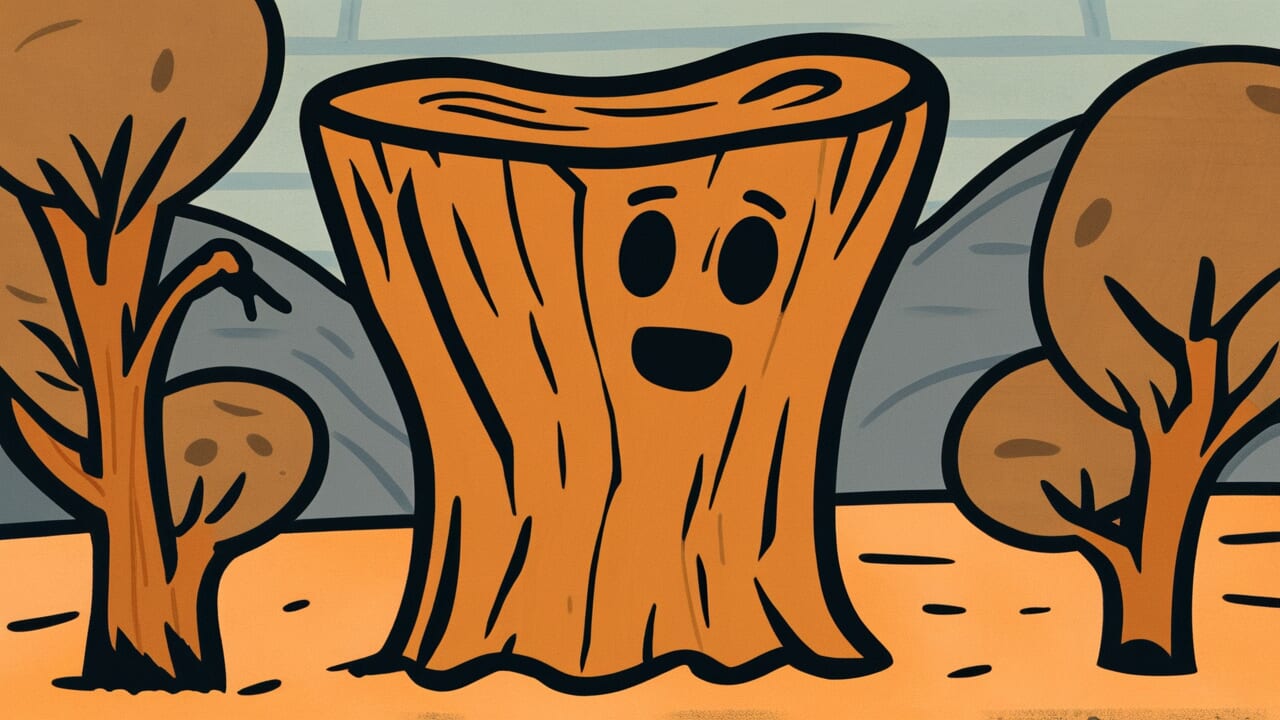How to Read “An old tree does not bend”
おいきはまがらぬ
Meaning of “An old tree does not bend”
“An old tree does not bend” is a proverb that means older people find it difficult to change their thoughts or habits.
Values, lifestyle habits, and ways of thinking built up over many years become deeply rooted as part of a person’s character.
When you’re young, it’s relatively easy to accept new ideas flexibly or change your lifestyle.
But as you age, experiences accumulate and you establish your own way of doing things.
This proverb is used to express the difficulty of asking elderly people to try new things or expecting them to change quickly.
It’s also used to explain and accept the stubborn attitudes of older people.
It’s not just a criticism. Even today, people understand it as an objective statement about natural human nature.
Origin and Etymology
No clear written records of this proverb’s origin seem to remain. However, we can make interesting observations from how the phrase is constructed.
“Old tree” refers to an ancient tree that has lived for many years.
Young trees are flexible. If you set up supports or pull them with rope, you can easily change their shape.
But trees that have grown for decades or centuries develop thick, hard trunks. Their shape becomes completely fixed.
If you try to bend them forcefully, they will break.
This observation of nature came to be used as a metaphor for human nature.
Japan has long had a culture of comparing tree growth to human life.
Many expressions teach life lessons through plant growth processes, like “Peaches and chestnuts take three years, persimmons eight years.”
During the Edo period especially, a seniority-based social system was established.
The experience and wisdom of elders were valued. At the same time, their stubbornness and resistance to change were also recognized.
This proverb likely emerged and spread from such social observations.
You can feel the wisdom of ancestors who sharply captured human nature through the familiar natural phenomenon of trees.
Usage Examples
- I tried to teach my father how to use a new smartphone, but an old tree does not bend—he ended up keeping his flip phone
- Following a younger boss’s instructions at my post-retirement job wasn’t easy, just like an old tree does not bend
Universal Wisdom
The proverb “An old tree does not bend” speaks to a universal truth that no one can avoid: human growth and rigidity.
As we live, we accumulate countless experiences.
Each one shapes our way of thinking and behavior patterns.
When we’re young, we’re like a blank canvas. We can paint any color freely.
But over time, that canvas fills with color. Adding new colors becomes difficult.
This isn’t entirely bad. Accumulated experience becomes wisdom.
Firm values become life guidelines.
But at the same time, resistance to change emerges.
Humans are creatures who seek stability.
Changing methods you’ve been familiar with for years creates psychological burden. Sometimes it even causes fear.
This proverb has been passed down for so long because this truth has been confirmed repeatedly in relationships across generations.
Young people are puzzled by the stubbornness of elders. Elders realize their own inability to change.
Our ancestors expressed that universal conflict through the beautiful metaphor of a single old tree.
The depth of human understanding is condensed in these few words.
When AI Hears This
The bendability of wood is determined by its moisture content.
Young trees contain over 60 percent water in their cells. When force is applied, they slowly change shape.
This is plastic deformation.
On the other hand, aged trees have moisture reduced to below 30 percent. A hard substance called lignin fills the cell walls.
When this happens, they don’t deform when you try to bend them. The moment a certain limit is exceeded, they snap.
What’s interesting is that human brain nerves follow a similar change.
In children’s brains, tens of thousands of synapses (nerve connections) are created and disappear daily.
The power to reorganize circuits according to new experiences—neuroplasticity—is extremely high.
But with age, frequently used circuits become thick and strong. Meanwhile, unused circuits are pruned away.
This is efficiency. But it also means reorganizing into new patterns becomes physically difficult.
Materials engineering teaches that when unreasonable force is applied to a hardened substance, destruction occurs rather than deformation.
Both old trees and long-hardened thought circuits will break if you try to forcefully bend them from outside.
In other words, this proverb identified through experience a truth of materials science: change has a “deformable period,” and after that passes, a different approach is needed.
Lessons for Today
This proverb teaches us two important perspectives.
One is understanding yourself. As you age, your way of thinking will harden without you noticing.
This is natural. But by being aware of it, you can make conscious efforts to maintain flexibility.
When you encounter new ideas, don’t reflexively reject them. Stop and think for a moment.
That small habit will enrich your life.
The other is compassion for others.
When elderly people have difficulty accepting change, it’s not laziness or stubbornness. It’s natural human nature.
With that understanding, you can avoid rushing or blaming them. You can respect their pace.
Much generational conflict arises from lack of this understanding.
Modern times are an era of rapid change. That’s exactly why we need kindness toward those who cannot change and awareness to maintain our own flexibility.
Even if complete change is difficult, we can gradually let in new winds.
That attitude may be the secret to continuing to grow even as we age.



Comments